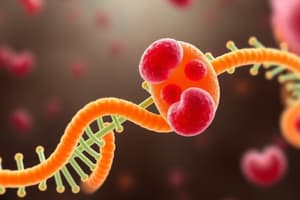Podcast
Questions and Answers
What is a mutation in biology?
What is a mutation in biology?
- An alteration in the protein sequence of an organism
- An alteration in the nucleic acid sequence of the genome of an organism, virus, or extrachromosomal DNA (correct)
- A change in the cell structure of an organism
- A transformation in the metabolic processes of an organism
What can cause mutations?
What can cause mutations?
- Errors during cell division
- All of these (correct)
- Exposure to ultraviolet radiation
- Insertion or deletion of segments of DNA
What may mutations result in?
What may mutations result in?
- No change in the observable characteristics of an organism
- Detectable changes in the observable characteristics of an organism
- None of these
- Either detectable or no change in the observable characteristics of an organism (correct)
What role do mutations play in biological processes?
What role do mutations play in biological processes?
What is the ultimate source of all genetic variation?
What is the ultimate source of all genetic variation?
Flashcards
What is a mutation?
What is a mutation?
A change in the DNA sequence of an organism.
What can cause mutations?
What can cause mutations?
Mutations can arise spontaneously or be caused by environmental factors like radiation or chemicals.
What may mutations result in?
What may mutations result in?
A mutation can lead to a noticeable change in the organism's traits, or it might have no visible effect.
What role do mutations play in biological processes?
What role do mutations play in biological processes?
Signup and view all the flashcards
What is the ultimate source of all genetic variation?
What is the ultimate source of all genetic variation?
Signup and view all the flashcards




